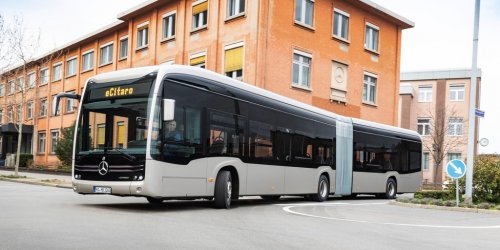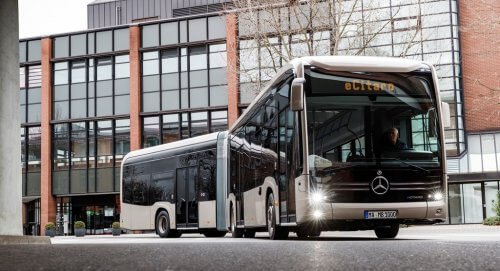Two years after the launch of the eCitaro, the fully-electric eCitaro G articulated bus with a capacity of up to 146 passengers has joined the Citaro city bus family. Mercedes-Benz says it marks an important step on the way to more environmentally friendly towns and cities. Shortly after its market launch, the new articulated bus will be available with new battery technology, including being the first bus in its category to be equipped with innovative solid-state batteries.

The German manufacturer says it already has definite orders for over 60 eCitaro Gs from half a dozen towns and cities, with the first deliveries to several operators planned for this year. The rigid version of the battery-electric eCitaro is already in series production vehicle manufactured at Daimler’s Mannheim plant, with hundreds in regular operation across Europe.
“I am really very pleased that our Mercedes-Benz eCitaro has established itself very well since its market launch. This shows that we are on the right track, offering products that our society wants and that our customers can work with. With the eCitaro as an articulated bus variant, we are consistently continuing the electrification of city buses: the eCitaro G will be equipped with innovative solid state batteries on request. In doing so, we are setting the course for sustainable and efficient passenger transport in urban centers,” said Till Oberwörder, Head of Daimler Buses.
The eCitaro G is being launched with the NMC variant of lithium-ion batteries that have proved their worth in the eCitaro rigid bus. It is expected that Mercedes-Benz will increase the performance of the eCitaro G this year by switching to a new generation of NMC batteries, pushing up capacity from 292 kWh to up to 396 kWh, with a corresponding increase in range.

At the same time the eCitaro G will have the option of innovative solid-state batteries to store energy. The bonus this brings is that solid-state batteries are characterised by high energy density and a particularly long service life. Chemically speaking these are lithium-polymer batteries, and are known as solid-state batteries because the usually liquid electrolyte is in solid form. Additionally, they do not use raw materials such as cobalt, nickel and manganese. Equipped with seven battery packs, this gives the eCitaro G a total capacity of 441 kWh and thus guarantees ranges typical of city bus operations.
As the use of solid-state batteries is extremely restricted for fast and thus intermediate charging, the battery technology covers different usage profiles than lithium-ion batteries (NMC). The latter are ideal for fast charging whether during breaks between journeys at the depot or along the route, which explains why Mercedes-Benz is pursuing a two-fold strategy and offering the eCitaro G with both battery technologies as an option.
From 2022 the range of the eCitaro and eCitaro G will be increased even further with a fuel cell as a range extender, eliminating the need for intermediate charging and the complex infrastructure required for it in almost all cases.


